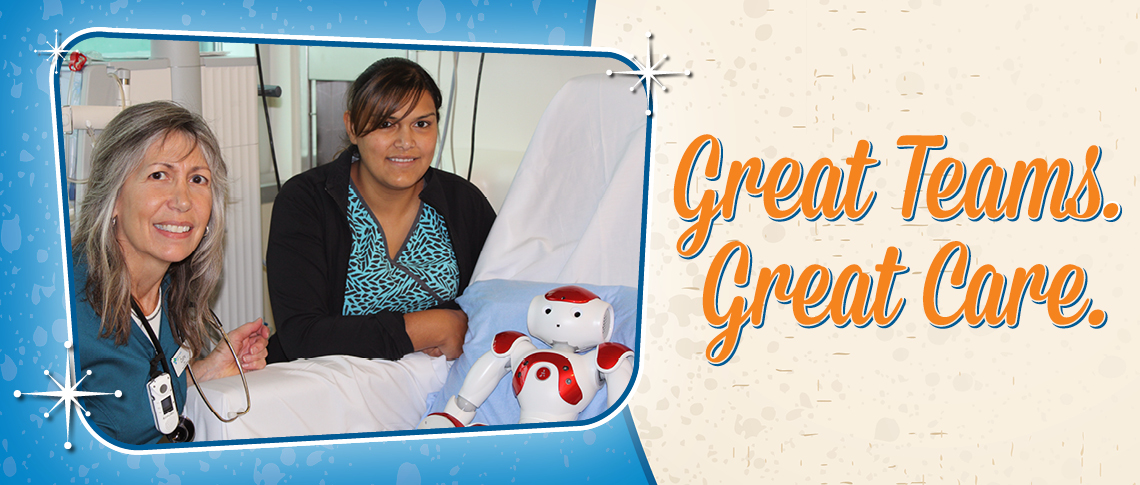

Story by Joanne Neilsen
When children have kidneys that aren’t working right, a team of expert renal/hemodialysis registered nurses at Alberta Children’s Hospital (ACH) are ready to help at a moment’s notice.
“We’re a small team of competent, senior RNS with a passion for hemodialysis work,” says Angie Arcuri, clinical nurse educator on Unit 3. “We have a great relationship with physicians, and also work closely with the Paediatric ICU (PICU) team. We respect one another’s skill and experience.”
“Their confidence and expertise means that they are frequently advising the nephrologists regarding the dialysis prescription and how to improve patient care,” says Dr. Andrew Wade, Paediatric Nephrologist and Director of Dialysis. “Every one of them has voluntarily chosen to be part of the program because they wanted an extra challenge above and beyond that offered on a busy paediatrics ward.”
“I can’t imagine working with a smarter, more dedicated group of professionals,” adds Wade.
Unit 3 is a 26-bed unit staffed by RNs and LPN's some whom have specialized renal and hemodialysis (HD) training. They support young patients with chronic kidney disease, complications stemming from other chronic conditions or trauma, acute and end-stage kidney disease, and patients awaiting kidney transplants.
“Kids with chronic renal disease undergo hemodialysis three-to-four times a week, for four-to-six hours at a time,” says Arcuri. “We get to know them well. Some patients start coming to our unit when they are five years old, and continue with us until they are 18.”
“We feel like we are their surrogate moms.”
Pediatric HD Team members must be RNs, and able to work without supervision. While only one HD team member works the night shift, someone is always on call 24/7.
“We are all super-flexible to meet patient needs” explains Arcuri. “We check in with one another and problem solve together to support patients. If we need to collaborate, even late at night, we’ll do a group text to get quick answers and discuss strategies.”
The HD team often work long hours to help patients with intense renal issues who are in acute and end stages of renal failure. The staff scheduler works with HD team members and all unit staff to provide appropriate coverage and ensure everyone is where they need to be, when they need to be there. Other Unit 3 staff members are often called upon to support these needed scheduling adjustments.
“We manage dialysis on the wards, in the dialysis unit and in the PICU,” says Wade. “It can happen at any time in the day or night, for three hours, or for three months.”
“When kids are sick, they try really hard, and most of them get better. That’s what keeps us passionate about what we do,” adds Arcuri.
Some patients are in PICU and very ill. They may be awaiting a kidney transplant and receiving continuous renal replacement therapy (CRRT).
“Those kids are generally in crisis, and if we can turn them around–we save a life. Recently we were able to help save a small infant we would not have been able to help 15 years ago,” explains Acuri.
Arcuri is clearly proud of her team, and impressed with what they do as a group, and individually.
“We count on one another through good times and sad times,” says Arcuri. “And, do everything we can to help our young patients get the best possible care.”
MEDI the robot is an extended member of the HD team. Two-foot tall and childlike, MEDI interacts with patients and their parents, and is programmed to mimic the actions of a child to calm apprehensive patients with small talk and high-fives during procedures–MEDI also tells stories and dances.
“MEDI helps distract the kids while we do medication changes, which can be painful,” says Angie Arcuri, nurse educator on unit 3. “They love when he dances for them!”
ACH has access to the first robots in Canada specifically programmed to help children manage painful or stressful medical procedures.
A study conducted by AHS and the University of Calgary showed children who interacted with the robots reported 50 per cent less pain compared to youngsters who received their vaccination with little or no distraction.